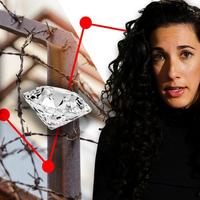How My Grandma Survived The Holocaust
- My grandmother survived the Holocaust
in the most badass way and this is that story.
(light music)
She was a teenager when the Nazis started to invade Poland.
This one older guy had the hots for my grandmother
and he wanted this special suit to be made.
This guy who needed a suit was well off.
His name was Leon.
So she suggested that he go to her father, who was a tailor.
He asked my great-grandfather, the tailor,
to make him a suit with a special pockets
so he could hide jewelry and money.
My grandmother was pretty popular at the time,
so she kind of strung him along a bit.
She always said that she had noticed
that he had really big hands and really nice teeth.
Apparently, this guy was kind of a lady's man.
We're not really sure who pursued who.
Sometime after September 1939,
her family and friends were forced
into a work camp in Poland.
Despite the harsh conditions, her relationship with Leon
continued to grow.
In late 1943, everyone was moved to a different camp,
specifically Majowka.
One day, the German officers gave shovels
to my grandmother, her friends, family, and 300 other people
so they could start digging their graves.
The plan was to shoot them all
so they would fall into the graves that they dug.
My grandmother was not having it.
She jumped on the officer's back.
His name was Schraff.
And started choking him.
Keep in mind, she was 19 or 20 at this time.
Like I said, badass.
She always made a point to say
that she dug her fingernails into his neck.
In the midst of the fight, he wrestled her to the ground
and shot her in the head.
But what Schraff didn't know
was that the bullet just grazed her forehead.
There was lots of blood, but she played dead.
Suddenly, there was an air raid or something
and the officers got distracted.
Everyone, prisoners and officers alike,
ended up going back to the barracks.
So, no one ended up getting killed that day.
My grandmother stayed there, bleeding, for a long time.
She claims it was all night.
Then, she went back to the barracks
and was like, "Surprise, I'm alive."
Everyone she was with ended up hiding her
under the barracks.
The next day, while on patrol,
the guards noticed my grandmother's body
wasn't where they had left her.
They knew she was hiding.
"Give her to us, or else we'll kill all of you."
So, of course, they give her up
and the guards beat her up some more.
From there, she was put in a jail
and a high-ranking officer was threatening to kill her.
As all hope seemed lost, in comes Leon.
He bribes the commander with jewelry,
specifically a diamond he had hidden in his secret pockets
that was sewn in by her father.
This bribe saved her life.
On a different night, Schraff,
the man who attempted to kill my grandmother,
was drunk at the barracks.
He was waving his gun, saying he was gonna shoot everyone.
Now, my grandmother was really sharp.
She knew high German.
So, she was always able to communicate with the Nazis.
Even though she didn't go through all her schooling,
she was pretty much fluent in five languages:
German, Polish, English, Yiddish, and Hebrew.
She was able to use this to her advantage
because she was able to calm Schraff down.
He ended up leaving the barracks
without killing anyone that night.
Some time passes and everyone in the barracks,
including Leon, is sent off to various camps.
My grandmother and her family were deported to Auschwitz.
Once there, her brother and father
get sent to Buna Werke Camp.
In January 1945, her and her mother march to Ravensbruck.
Her mother gets ill after the march
and ends up in the infirmary.
My grandmother visits her every day.
She knew her mother was close to death,
so she cut off a lock of her hair.
The next day, when she went back to the infirmary,
her mother was gone.
My grandmother kept that lock of hair
in a locket she always wore around her neck.
Fast forward to the end of the war
and the camps get liberated.
(cheering)
My grandmother ends up in Sweden with the Red Cross.
She learns that Leon had survived
and was in a hospital in Germany.
She finds out that her brother and father had died.
So she tracks down Leon.
She finds him and meets his remaining family in Berlin.
And they get married.
Shortly after, in 1947, they move
to Charleston, South Carolina.
They had six kids, one of which is my father.
My grandfather owned a bunch of businesses
and my grandmother owned a dressmaking shop.
They were together until my grandfather died in 1973.
My grandmother actually went to court
to testify against Schraff and helped put him away.
(light music)
- [Interviewer] Would you tell me your name, please?
(squeaking)

